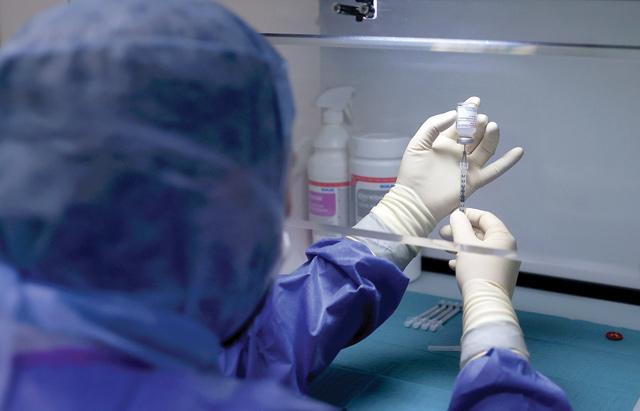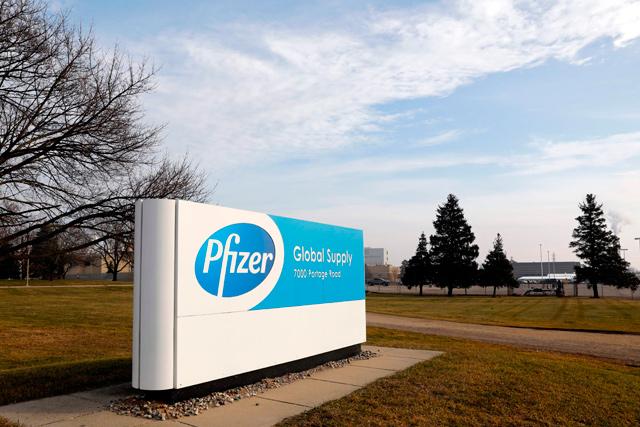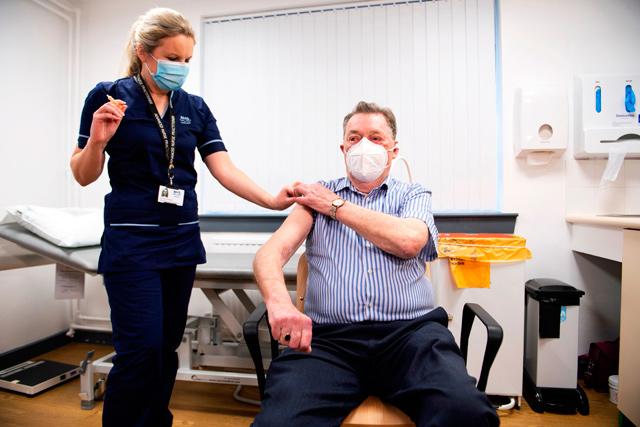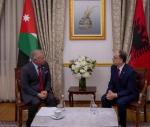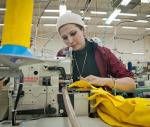You are here
Egypt kicks off vaccine drive as France tightens borders
By AFP - Jan 24,2021 - Last updated at Jan 24,2021

Egyptian Health Minister Hala Zayed (left) gives a press conference, accompanied by doctor Abdelmouim Selem (centre) and medical staff member Ahmed Hemdan, in a tent set up outside the Abou Khalifa Hospital in Ismailia, about 120km east the capital Cairo, on Sunday (AFP photo)
ISMAILIA, Egypt — Egypt, the Arab world's most populous country, began its mass coronavirus vaccination campaign on Sunday, as several large nations struggled with their inoculation rollouts and France imposed new border controls.
More than 2.1 million people have been killed by COVID-19 since it emerged in late 2019, with almost 99 million cases registered worldwide, according to an AFP tally from official figures.
A doctor and a nurse were the first to receive the Chinese-made Sinopharm jab in Egypt, after President Abdel Fattah Al Sisi said "healthcare workers, followed by those suffering from chronic diseases and the elderly" would be first in line.
"All healthcare workers will receive it for free, it's their right," Health Minister Hala Zayed said, adding that more than 300 doctors have died of COVID-19 in Egypt.
Zayed said Cairo had inked deals to receive vaccine shipments from British, Chinese and Russian firms, for a total of around 100 million doses — enough for around half Egypt's population.
In Europe, France imposed a requirement for a negative PCR test for arrivals by sea and air from European Union neighbours — a measure required for non-EU arrivals since mid-January.
France's rule does not apply to those travelling by land, including thousands of cross-border workers.
The country had by Saturday given 1 million people at least one vaccine dose, Prime Minister Jean Castex said four weeks into the campaign, a relatively slow ramp-up compared with leading vaccinators like Israel.
Sweden said on Sunday it would prohibit entry from Norway for three weeks, after a case of the more transmissible strain that emerged in Britain was detected in Oslo.
The measure will come into effect from midnight on Monday and exceptions will be made for those living in Sweden, the interior ministry said.
Larger countries like Brazil and India have faced vaccine struggles of their own, as organisational failings and public fears over side effects hobble progress.
Isabella Ballalai, vice president of the Brazilian Society for Immunology (SBIM) charged the health ministry with “incompetence” as the country risks running out of doses as well as vital equipment like syringes.
Vaccine-sceptic President Jair Bolsonaro has been accused of raising Chinese hackles with his criticism of the country’s CoronaVac shot, with experts saying he may have contributed to supply chain problems.
Thousands of people in several cities mounted protests this weekend demanding Bolsonaro’s ouster.
In India, around one-third of people are not turning up for vaccine appointments, with fear of side effects high after reports of a few cases of severe reactions spread widely through the media and messaging services.
“I am very afraid. I hate needles and I am worried about side effects,” 17-year-old pharma student Khushi Dhingra said with tears in her eyes as she waited in line for the vaccine at Sharda Hospital in Greater Noida, near New Delhi.
Norway’s Institute of Public Health and France’s ANSM medicines agency have both said there is no evidence the vaccines were to blame in the deaths of small numbers of nursing home residents who died after receiving them.
In the Gulf, the emirate of Dubai said it had slowed its rollout of the Pfizer-BioNTech jab, faced with a bottleneck in deliveries that has also hit EU countries as Pfizer upgrades a key plant in Belgium.
There were protests against anti-virus restrictions in several European cities on the weekend, including Amsterdam and Eindhoven in The Netherlands.
After a rally in Denmark’s capital Copenhagen on Saturday night, police said they arrested two men on suspicion of setting a mannequin on fire made to look like Danish Prime Minister Mette Frederiksen.
Germany said on Sunday it had paid $400 million for 200,000 doses of the experimental antibody treatment used on former US President Donald Trump.
“They work like a passive vaccination. Administering these antibodies in the early stages can help high-risk patients avoid a more serious progression,” Health Minister Jens Spahn told weekly Bild am Sonntag.
In New Zealand, officials on Sunday confirmed the first case of COVID-19 in the community for more than two months in a 56-year-old woman who had recently returned from Europe.
In Britain, Sky television said Kenneth Branagh would star as Prime Minister Boris Johnson in a TV drama about the country’s handling of the outbreak.
Set to air on Sky Atlantic next year, director Michael Winterbottom said the show would focus on “the efforts of scientists, doctors, care home workers and policy makers to protect us from the virus”.
Related Articles
PARIS — US biotech firm Moderna said Monday its vaccine should remain protective against key coronavirus variants while the unrelenting pand
WASHINGTON — The US green-lit the Pfizer-BioNTech COVID-19 vaccine late Friday, paving the way for millions of vulnerable people to receive
LONDON — Britain on Monday began rolling out the Oxford-AstraZeneca coronavirus vaccine, a possible game-changer in fighting the disease wor


